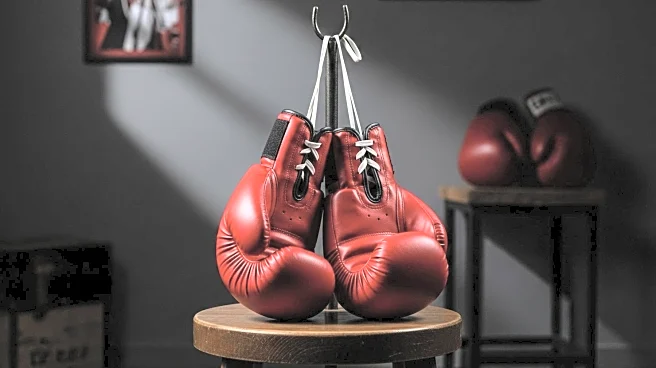What's Happening?
Italian boxer Angela Carini has disclosed the online abuse she faced after quitting her Olympic match against Algeria's Imane Khelif at the Paris Olympics. Carini withdrew from the bout after 46 seconds, citing the impact of Khelif's punches. Khelif, who had previously failed gender eligibility tests, went on to win the gold medal. Carini shared a video on Instagram detailing the abusive messages she received, which included derogatory remarks and calls for her to avoid future Olympic participation. The incident has sparked discussions about gender eligibility in sports, with figures like President Trump and Italian Premier Giorgia Meloni weighing in. Carini expressed that the experience has significantly affected her career, although she has since returned to the ring, winning her eighth Italian title and a gold medal at the World Boxing Cup in Poland.
Why It's Important?
The situation highlights ongoing debates about gender eligibility in sports, particularly in women's categories. Carini's experience underscores the psychological impact of online abuse on athletes, raising concerns about mental health support in competitive sports. The controversy surrounding Khelif's participation has prompted calls for stricter gender testing policies, with implications for future Olympic events. The International Olympic Committee's defense of the Paris Games results and the introduction of new policies by the International Boxing Association reflect the complexities of ensuring fair competition while addressing gender identity issues. This case may influence future policies and discussions on gender eligibility in sports, affecting athletes, sports organizations, and public perceptions.
What's Next?
The International Boxing Association has introduced mandatory sex testing policies, which Khelif has appealed. The outcome of this appeal could set precedents for future gender eligibility cases in sports. New IOC President Kirsty Coventry has initiated a task force to address these issues, potentially leading to revised guidelines for the 2028 Los Angeles Olympics. Stakeholders, including sports organizations and advocacy groups, are likely to continue discussions on balancing fairness and inclusivity in sports. The broader implications for gender identity and sports eligibility may influence public policy and societal attitudes towards transgender athletes.
Beyond the Headlines
The ethical dimensions of gender testing in sports raise questions about privacy, discrimination, and the rights of athletes. The backlash against Carini and the scrutiny of Khelif's gender identity reflect societal tensions around gender norms and inclusivity. This case may contribute to broader cultural shifts in how gender is perceived and addressed in competitive sports, potentially influencing legal frameworks and advocacy efforts. The psychological impact on athletes facing such scrutiny highlights the need for comprehensive support systems within sports organizations.









